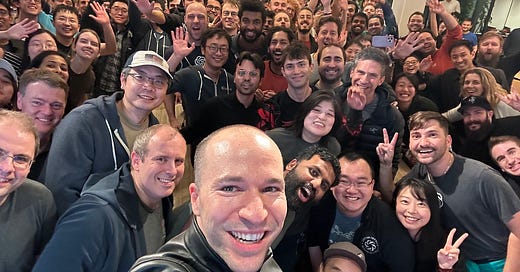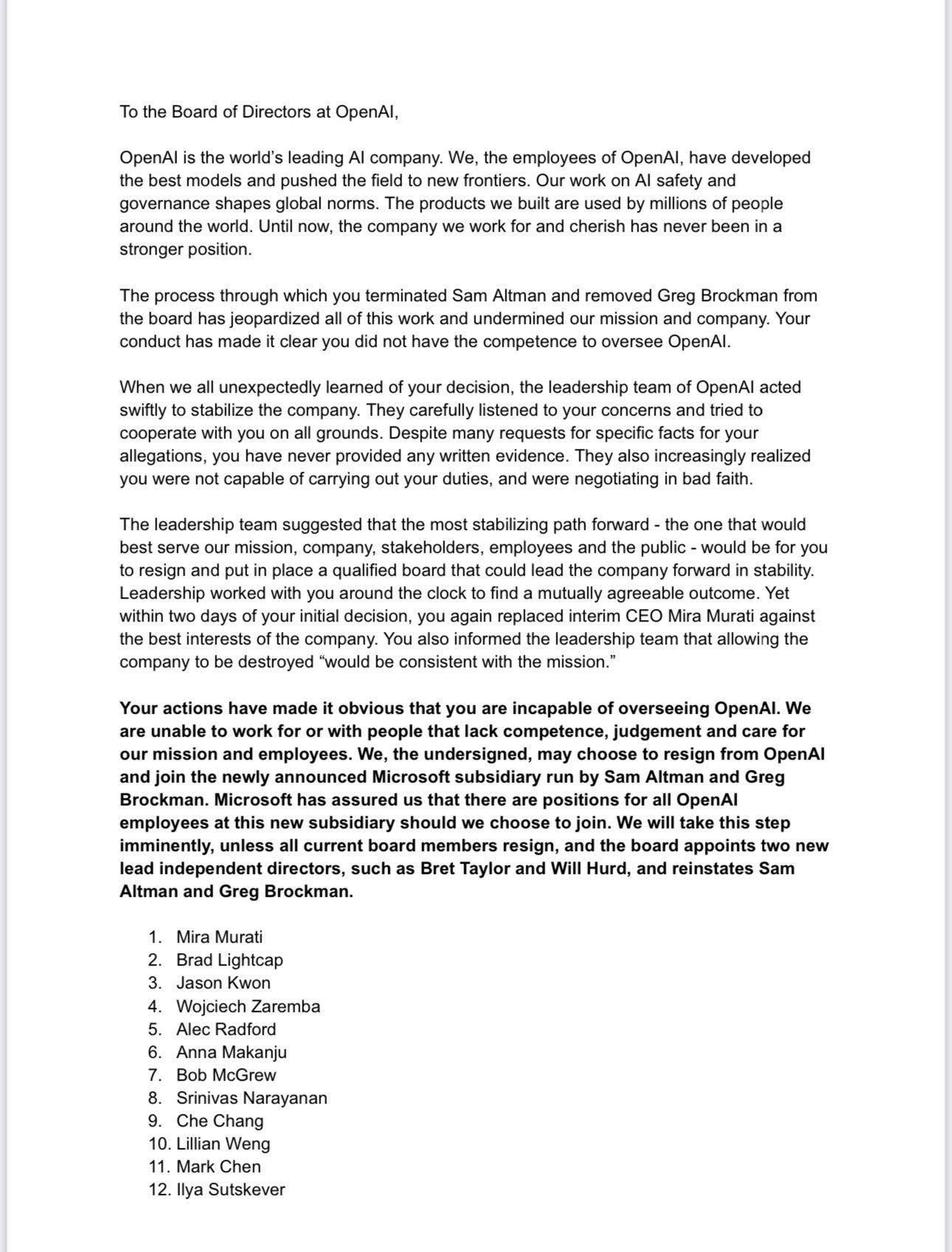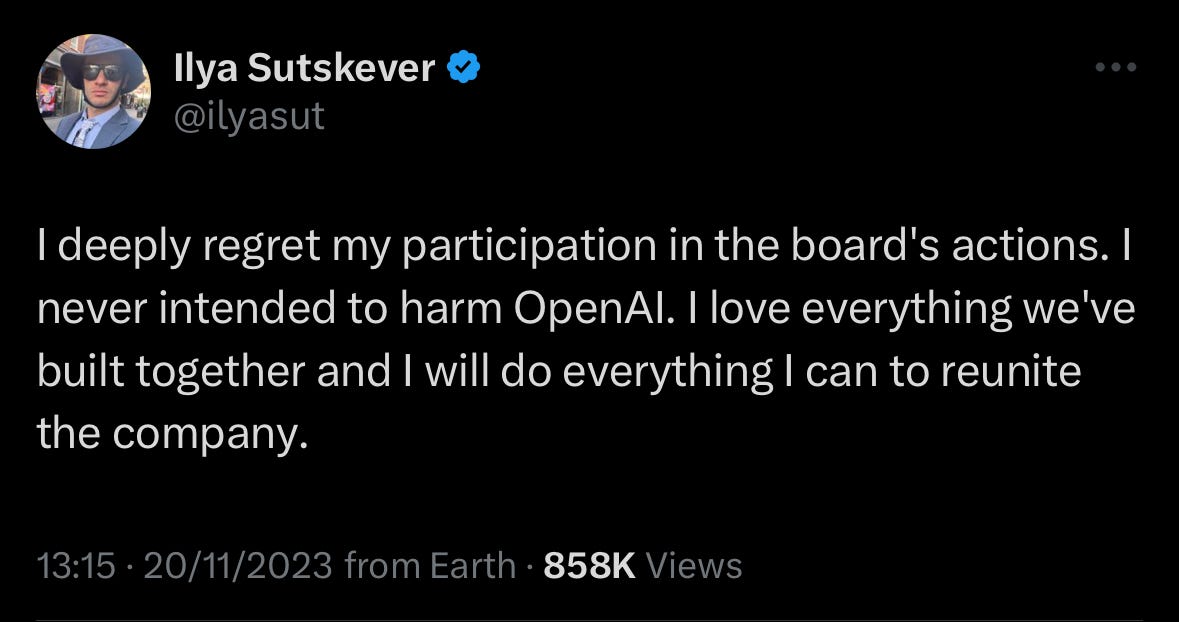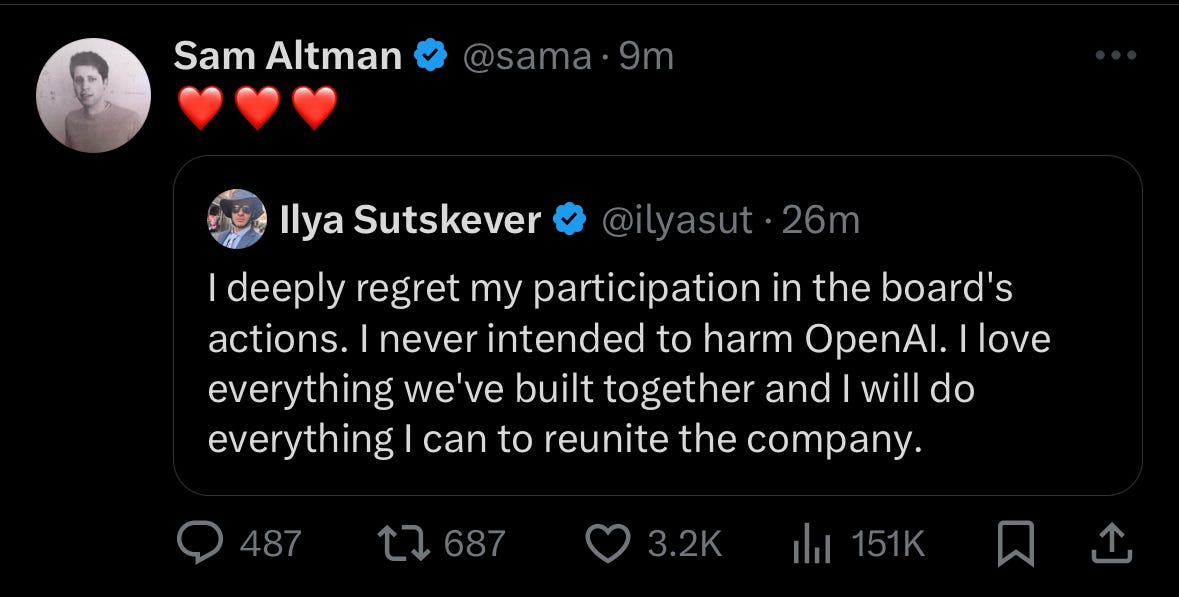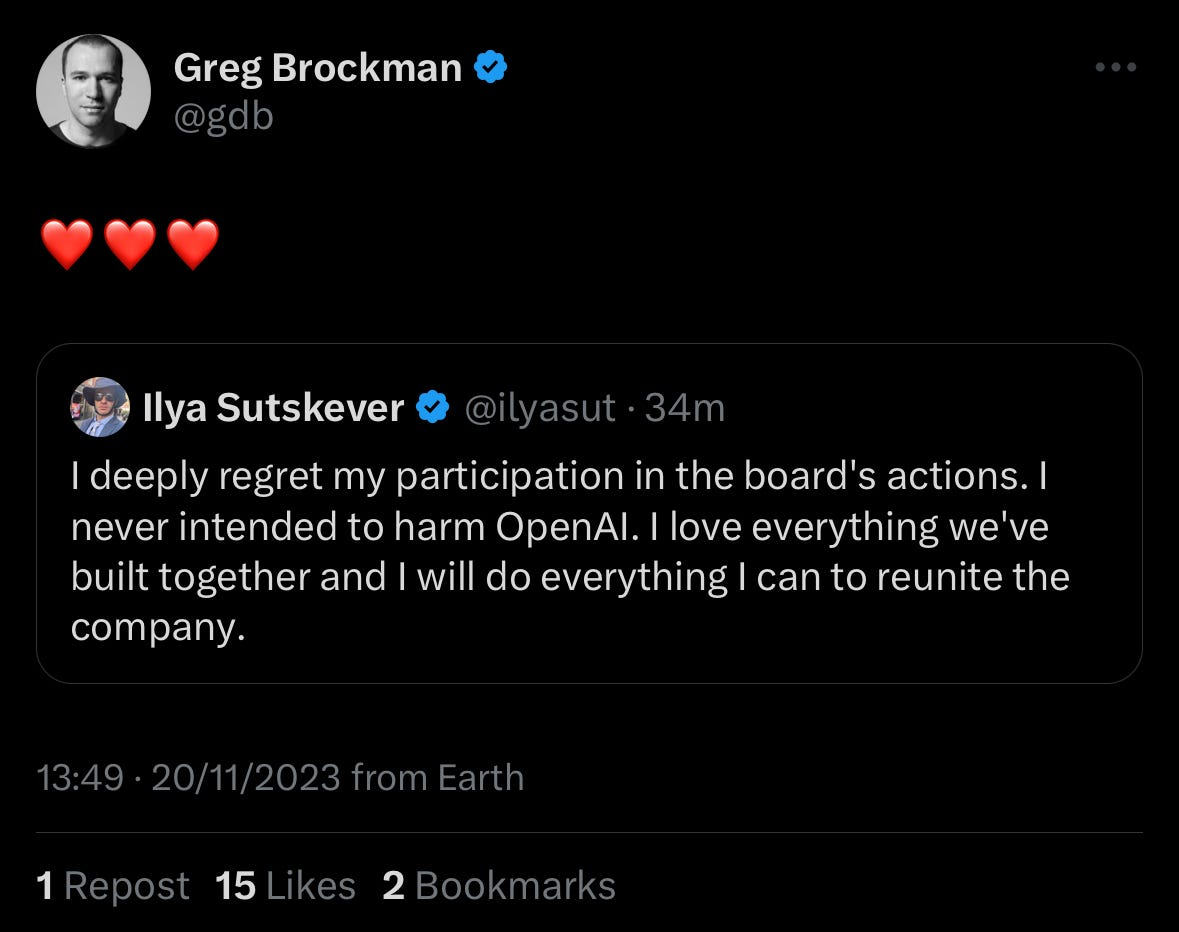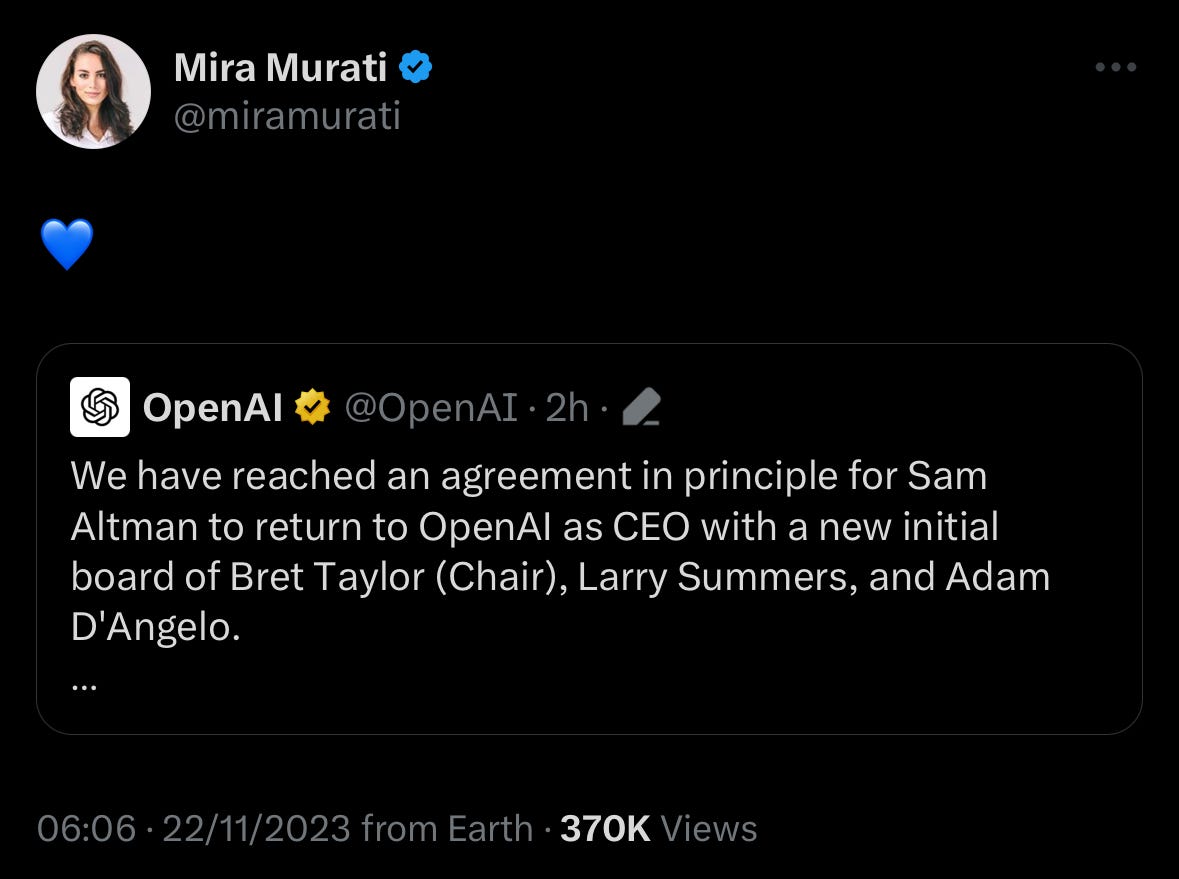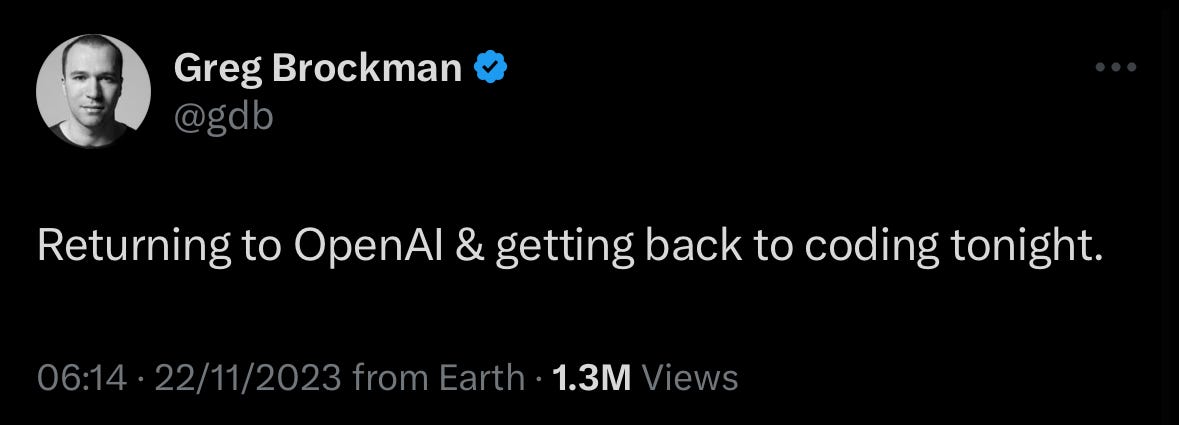So, after five tumultuous days it seems OpenAI is almost back to where it started, just with the small detail of a new board being put in place. To say what has happened at OpenAI is unprecedented is a huge understatement. It’s very rare for us to see a company that has so much of the spotlight, and is potentially so strategically important to humanity, as OpenAI. For a company in that position to implode out of nowhere (especially after such a successful DevDay), pull itself back together, and hopefully steady itself is hard to get your head around.
I’m not sure we’ll ever fully know the details behind what instigated the ousting of Sam Altman in the first place, but reflecting on everything that’s transpired, the one thing that stands out to me is that we’ve seen a masterclass in leadership.
Obviously not a masterclass from the ex. board of OpenAI (that’s been a sh!t show) but a masterclass from Sam Altman (CEO), Greg Brockman (President), Satya Nadella, Ilya Sutskever (yes even him!), Mira Murati (CTO), Brad Lightcap (COO), Jason Kwon (CSO), and the many other leaders at OpenAI. In fact, every single employee at OpenAI, regardless of their role, experience, or level have taught us valuable leadership lessons one way or another. Below I’ve outlined the five that I think are the most important and impactful.
🫡 MISSION DRIVEN LEADERSHIP
Throughout the whole OpenAI saga this week, one thing that both Sam Altman and Greg Brockman kept emphasising was that the mission would continue. Below is a quick reminder of the OpenAI mission that every employee there so passionately believes in:
Our mission is to ensure that artificial general intelligence benefits all of humanity.
Since its founding, OpenAI has been set up as a mission-driven organisation. This is a core part of the culture of OpenAI and the mission was very carefully and purposefully crafted from the start. The articulation of that mission has evolved over time, but it is the singular reason why OpenAI is the company that it is today.
OpenAI’s mission is at the core of the organisation for one big reason - talent. Talent is undoubtedly the battleground that matters most, to most companies, especially in technology, and especially in Silicon Valley. You can see this just from how desperately Marc Benioff was trying to entice OpenAI staff over to Salesforce on Tuesday, promising them full cash & equity OTE and inviting them to email his office directly with their CV 🤯.
When Sam Altman, Greg Brockman and the other founders were setting up OpenAI they realised that to attract the best talent in AI that they had to have a larger purpose and mission. This is because AI professionals are a very different breed from your typical tech talent in Silicon Valley:
They are not just looking for a job, but also seeking purpose.
For them it’s not about the money or fame - the reward comes from helping humanity make progress.
They have very strong interests in the ethical implications of technology.
They are driven by opportunities for learning and personal growth.
The AI community is very open and highly collaborative.
So, having a clearly defined mission that aligns with what’s important to AI talent has been vitally important to OpenAI in attracting that talent. But having such a strong mission-orientated organisation goes further than that - it sets the vision, gives everyone clarity and purpose and also engenders a huge amount of loyalty amongst employees.
KEY TAKEOUT: A clear, purpose-driven mission can help attract the best talent, inspire them and foster deep-rooted loyalty within an organisation.
👏 THE IMPORTANCE OF LOYALTY
At the last count, c.95% of the 770 employees at OpenAI had signed the letter above which was addressed to the Board of Directors at OpenAI. If that’s not a vote of no-confidence then I don’t know what is! Stepping back from this extraordinary letter though, there were many other amazing shows of loyalty, especially over the weekend when most of the situations at OpenAI was unfolding:
Within hours of Sam Altman being ousted and Greg Brockman quitting, three other key employees resigned: Jakub Pachocki, Szymon Sidor, and Aleksander Madry. No additional details beyond the OpenAI Board’s original statement had been shared by then, these three people just knew that if Sam and Greg weren’t at OpenAI then they didn’t want to be either.
Over the weekend, a huge number of OpenAI employees cancelled their plans so that they could be in the office and show moral support for Sam, Greg and the remaining leadership team, as well as each other.
On Monday, there was a rallying cry on X (Twitter) of employees tweeting ‘OpenAI is nothing without its people’ ahead of any letter being written or signed. Many of these tweets were reposted and 💛’d by Sam Altman, Greg Brockman and other OpenAI leaders. This was a huge showing of solidarity from OpenAI employees - not just with the leaders who left, but with each other as well.
I’m sure there are plenty of other showings of loyalty from the OpenAI team during this episode that go beyond what I’ve shared above. To see this level of support from employees is unprecedented (as far as I’m aware) and demonstrates a huge level of psychological safety at OpenAI that’s rarely seen in organisations. Much of this stems from OpenAI’s mission driven culture and the working environment they’ve fostered to attract the best AI talent.
KEY TAKEOUT: Fostering deep-rooted employee loyalty can help leaders through even the worst of times.
🤝 THE POWER OF PARTNERSHIP
In one of the first interviews Satya Nadella did following his move to (temporarily) bring Sam Altman and Greg Brockman into Microsoft, following their departures from OpenAI, he over and over again emphasised the importance of partnership. Below is a great quote from the interview that really sums this up:
“In Silicon Valley people talk about who is getting ahead of the other, but I believe in partnerships, in fact on of the most understated things is that great partnerships can create lots of enterprise value”
Not many people really understand the extent of the OpenAI <> Microsoft partnership, so let me summarise:
Microsoft have invested c.$13bn in OpenAI, partly in cash, but mostly in Azure credits for compute etc.
This investment has resulted in Microsoft owning c.49% of OpenAI as a business
The partnership is far more than just cash and compute though. Microsoft own a huge amount of OpenAI’s IP as part of the partnership agreement - They own the models, the weights, the data the models are trained on, the code etc.
Microsoft have in turn committed to building and tailoring all of the infrastructure OpenAI requires to achieve their mission.
OpenAI and Microsoft obviously have a very unique and powerful partnership. There are real synergies from how they work together and everyone benefits. A real life 1 + 1 = 3. This partnership gives OpenAI the funding and access to compute that they need to continue their mission and it gives Microsoft access to the best AI talent in the business as well as a significant first-mover advantage on any advances that OpenAI make.
KEY TAKEOUT: Partnerships > Competition and provide leaders and their companies with access to resources and synergies they couldn’t access alone.
😬 ADMITTING WHEN YOU’RE WRONG
When Sam Altman was removed from his role as CEO and Greg Brockman resigned after being removed as the chair of the board, Greg shared on X that it was Ilya Sutskever that had conducted all of the phone calls and conveyed the Board’s wishes. It’s still unclear how much on an instigator Ilya Sutskever was in the board’s decision, but according to reports, he made a U-turn after an emotional conversation with Greg’s wife Anna over the weekend.
This was obviously a very difficult about turn for Ilya to make, after what I’m sure would have been a very difficult experience when conveying the board’s decision. Both Sam and Greg immediately reacted to Ilya’s post on X, with a sign of love and confirmation that all had been forgiven.
Ilya Sutskever admitting that he was wrong so publicly shows humility and an ability to take responsibility for his actions and their consequences. Doing this will have gone a long way in rebuilding trust with Sam, Greg and everyone else at OpenAI and I am sure has played a large role in getting the band back together.
Similarly, both Sam and Greg showed unity, an ability to forgive and to quickly move on. Their reactions will also have gone a long way in showing stability during a very chaotic period for OpenAI.
KEY TAKEOUT: Admitting mistakes, taking responsibility for your actions and reacting swiftly are vital for effective leadership and maintaining trust and loyalty.
❤️ THE POWER OF LOVE
Beyond the love that both Sam and Greg showed Ilya, there was a huge outpouring of love from all parts of OpenAI whilst the situation was unfolding. This ranged from lots of ❤️’s on X to Sam repeatedly tweeting his love for the company and it’s people:
Such a public outpouring of positive emotions from a leader is rare, but given the circumstances, it’s completely unprecedented. It shows a huge amount of humanity, vulnerability, commitment, and humility - all vitally important in modern leadership. Emotional leadership like this can foster a sense of connection and empathy amongst employees and during these circumstances will have gone a long way to calm the sense of chaos that must have been pervasive at OpenAI.
Traditionally, leaders have shied away from such public displays of love but I hope this is something that we see more often and from more leaders in the future.
KEY TAKEOUT: Expressing positive emotions is a key part of being an authentic leader and can contribute to a stronger and more resilient organisation.
WRAPPING THINGS UP
I sincerely hope we never see another company and its employees go through similar events to what transpired at OpenAI over the last five days. It will have been incredibly difficult for everyone involved and destabilised what was quickly becoming an incredibly successful company that I’m sure Steve Jobs would have agreed has been putting a dent in the universe.
There are many leadership lessons to be taken from the behaviours of many of the leaders at OpenAI as well as the actions of all of the employees, and I’ve covered the five that I think are the most important:
🫡 Mission driven leadership - a clear, purpose-driven mission can help attract the best talent, inspire them and foster deep-rooted loyalty within an organisation.
👏 The importance of loyalty - fostering deep-rooted employee loyalty can help leaders through even the worst of times.
🤝 The power of partnership - partnerships > competition and provide leaders and their companies with access to resources and synergies they couldn’t access alone.
😬 Admitting when you’re wrong - admitting mistakes, taking responsibility for your actions and reacting swiftly are vital for effective leadership and maintaining trust and loyalty.
❤️ The power of love - expressing positive emotions is a key part of being an authentic leader and can contribute to a stronger and more resilient organisation.
If you think there are other leadership lessons you think we should be drawing from the last five days at OpenAI please let me know in the comments below.
P.S. I think we should all agree what a legend Greg Brockman is. He was the chair of the board, the president of the company, and one of the original founders. I’m sure he’s got a few things on his plate right now, but he’s straight back to coding 💪.
If you’re interested in why he’s such a legend, this blog post from Sam Altman couldn’t put it any better. It’s just titled Greg.
P.P.S. We should all also agree what a legend Kara Swisher is. Her reporting on this whole situation has been on point and could only have come from someone like her (there aren’t any others!) who has the connections and experience to cut through the noise and comment on what’s really going on 🧐.
P.P.P.S. I’m really sad that this mostly all played out on X (Twitter) and that I’ve shared so many screenshots and links to X in this post. I’m sad because the fact that this situation played out of X will have encouraged more people back on to a platform that has become so completely toxic under Musk’s leadership that even advertisers are deserting it in their droves.
“The future is already here, it’s just not evenly distributed.“
William Gibson


